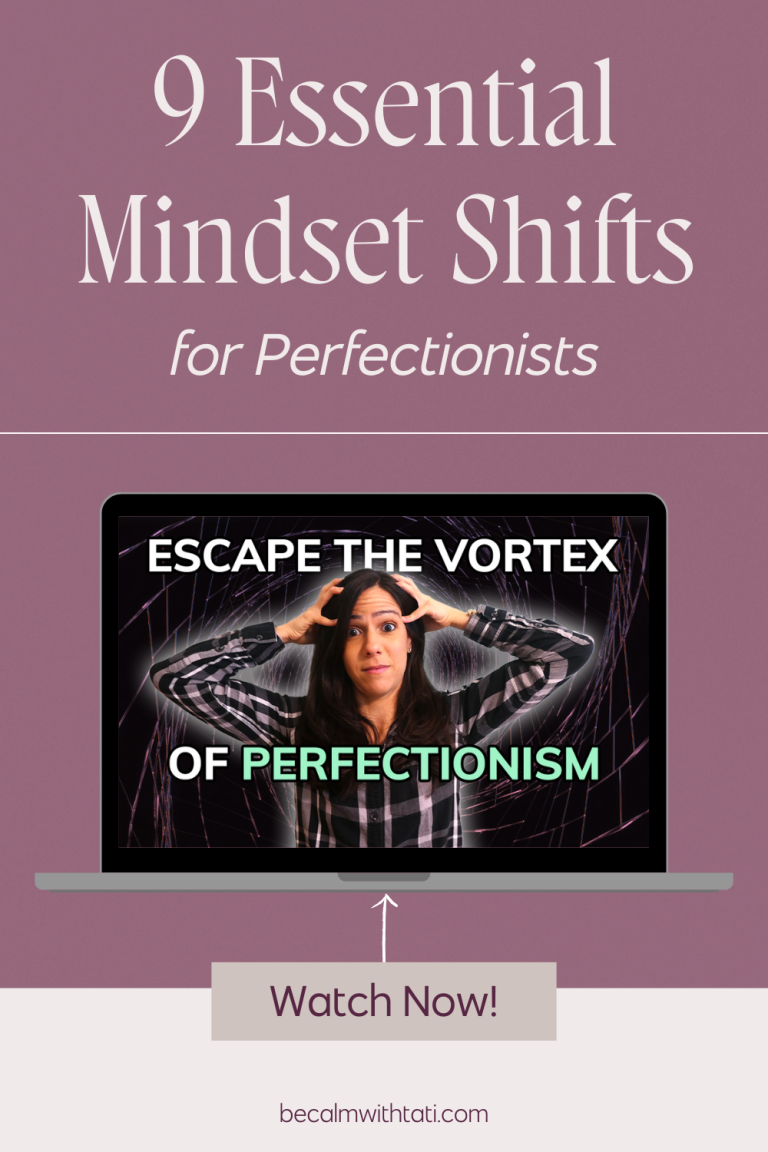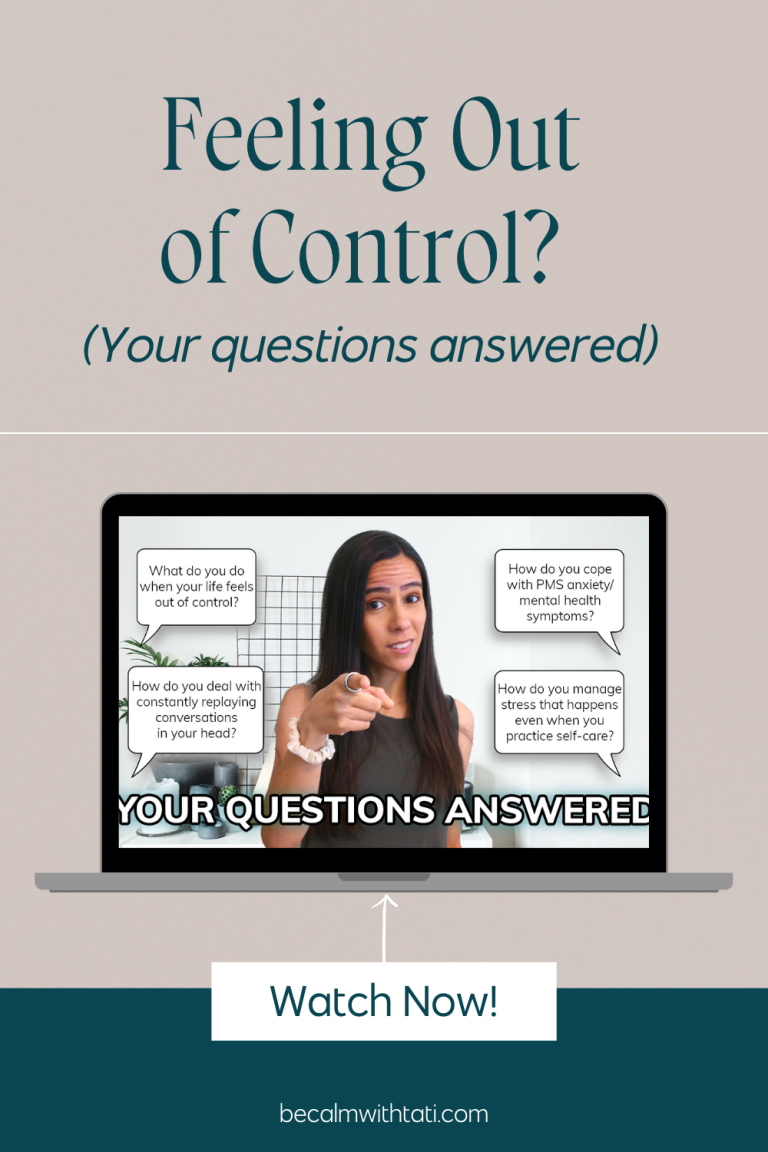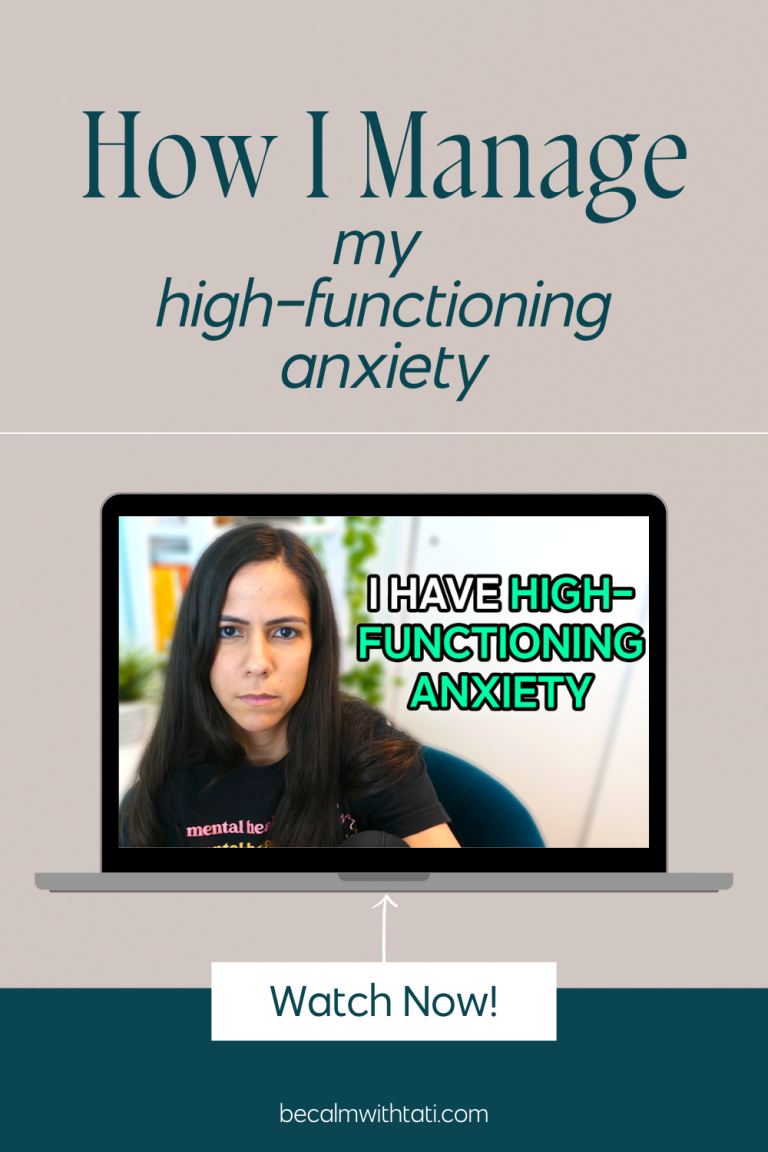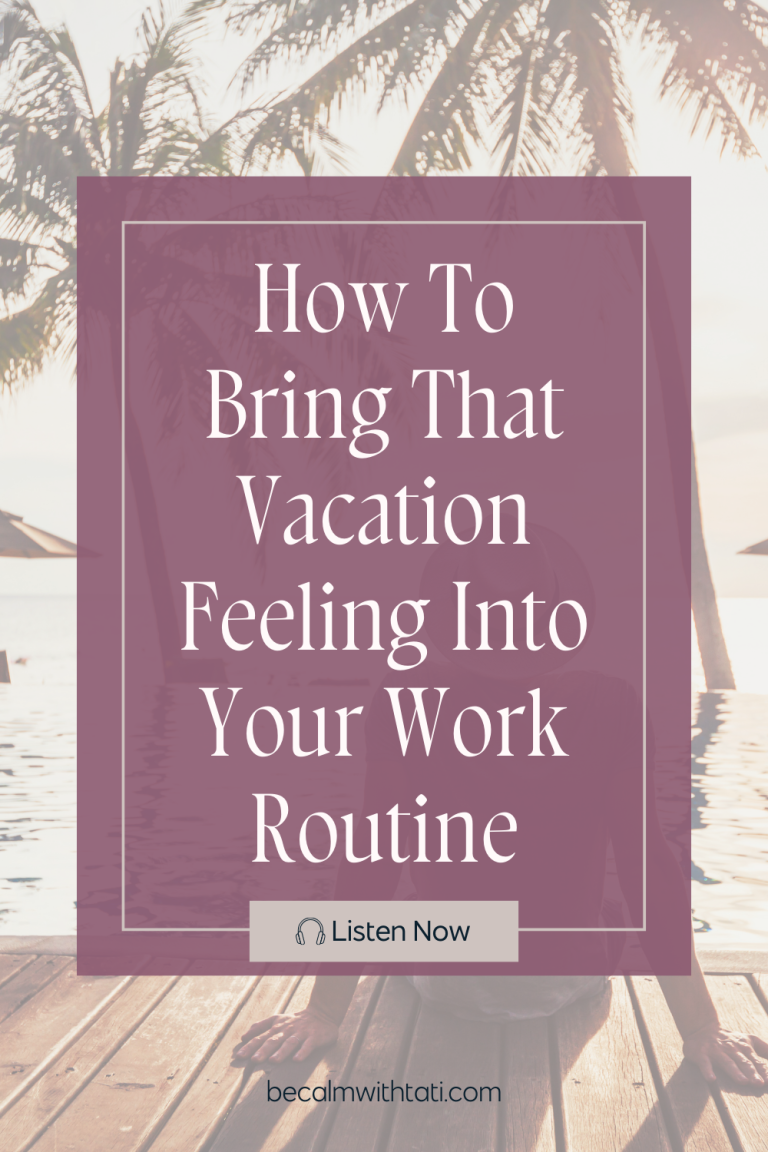In our hyper-productive culture, it can be incredibly easy to confuse being burnt out for laziness, because they can feel like one and the same. The problem is… it’s okay and necessary to be lazy every once in a while, but being in a state of burnout is NOT okay and is ultimately unsustainable, potentially leading to more serious mental health consequences down the road if you don’t do anything to address it. In this episode, we’ll dive into the difference between laziness and burnout, and what you can do to recover from burnout and gain your discipline back.
In this episode, you will learn:
- The difference between LAZINESS and BURNOUT
- Signs you’re burnt out
- 4 simple tips to help you recover from burnout and gain your energy back
Mentioned in episode:
Why High-Functioning Anxiety Leads to Burnout: https://www.becalmwithtati.com/high-functioning-anxiety-and-burnout/
How to Recover from Burnout: https://www.becalmwithtati.com/how-to-recover-from-burnout/
LISTEN NOW:
🎧 CLICK HERE TO LISTEN TO CALMLY COPING WHEREVER YOU LISTEN TO PODCASTS
WATCH NOW:
FREE TRAINING: How to Create Work-Life Balance and Feel Calmer From Within
If you want to learn how to take back control of your life so you can feel calmer and more confident, and learn the tools to spend your time according to what matters most to you (no matter what your schedule is like right now)…
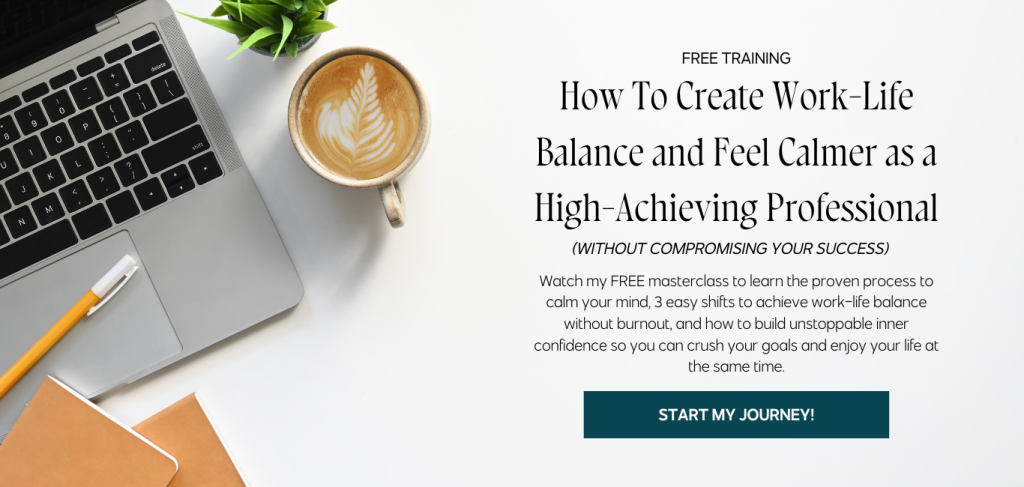
LISTEN, REVIEW, AND SUBSCRIBE TO THE PODCAST!
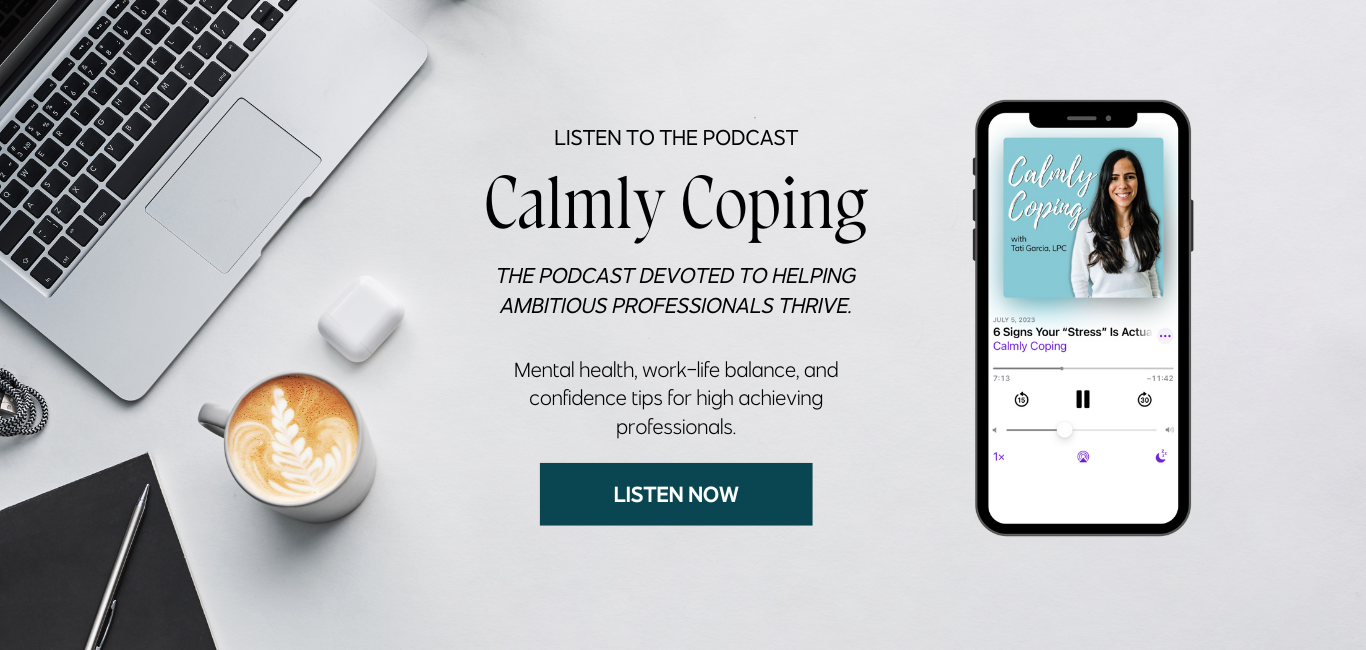
INTRO/OUTRO MUSIC: Rescue Me (Instrumental) by Aussens@iter (c) copyright 2018 Licensed under a Creative Commons Attribution (3.0) license. http://dig.ccmixter.org/files/tobias_weber/57990 Ft: Copperhead
DISCLAIMER: All content here is for informational purposes only. This content does not replace the professional judgment of your own mental health provider. Please consult a licensed mental health professional for all individual questions and issues.
Interested in diving deeper to get support for high-functioning anxiety?
I offer 1:1 coaching to help high-achievers overcoming high-functioning anxiety so they can feel calmer, more present, and have improved balance in their lives. Click here if you’re interested in learning more and getting started.
Calm, Balanced, & Confident is my comprehensive A→Z self-paced course to help high-achieving professionals overcome high-functioning anxiety so they can feel calmer, balanced, and more confident without the anxiety and overwhelm. Click here to learn more and enroll today.
Looking for ongoing support and guidance with high-functioning anxiety? The Calm & Ambitious Community is the exclusive community for high achievers with high-functioning anxiety. Click here to learn more and join us today!
TRANSCRIPT:
Click to view the episode transcript.
In our hyper productive culture, it can be incredibly easy to confuse being burnt out for laziness because they can feel like one and the same. It’s okay and necessary to be lazy every once in a while. But being in a state of burnout is not okay and is ultimately unsustainable, potentially leading to more serious mental health consequences down the road if you don’t do anything to address it.
In this episode, we’ll dive into the difference between laziness and burnout and what you can do to recover from burnout and gain your discipline back. Welcome to Calmly Coping. I’m your host Tati Garcia. I’m a licensed therapist and a high functioning anxiety coach. Calmly Coping is the podcast for people who struggle with anxiety and high functioning anxiety.
Each Wednesday, you’ll hear informative episodes with actionable tips about decreasing anxiety, adopting a healthy mindset, and managing your time and energy so you can live a calm and balanced life. Let’s get started.
Thank you so much for tuning in. I work with so many high achieving individuals who are already doing well. And yet they put so much pressure on themselves to do even more. They add more to their to do lists, and then they feel lazy when they can’t check everything off. They wonder what is wrong with them that they just can’t seem to do it all, and then call themselves lazy and undisciplined as a result.
I have absolutely been there. And now looking from the outside in, it still astounds me when people who are doing so much for others, their jobs, families, volunteer activities, household responsibilities, and more, consistently fail to do even five percent of that for themselves. And then they call themselves lazy.
It’s not laziness. If you consistently disregard your own needs and then keep doing more and more, then you will reach a state of burnout and absolutely feel lazy, unmotivated, tired, exhausted, and lose passion for the things that you once enjoyed. I’ve been there and I know it’s absolutely possible to get out of burnout and bring the joy and energy back into your life.
So first let’s talk about what burnout is. So burnout is a state of emotional, physical, and mental exhaustion caused by excessive and prolonged stress. So it can come from overworking and just constantly doing more, having a lot of stress in your life, being a caregiver, and caring for others in any way.
And here are some signs and symptoms of burnout. So it could lead to increased irritability at both work and in your personal relationships. Feelings of overwhelm and a never ending to do list. Feeling constantly drained and or having difficulty sleeping. Difficulty waking up or getting out of bed in the morning.
Never feeling like you can relax or take a break. Feeling pessimistic and as though you don’t have support or you’re alone in your work or tasks. Feeling cynical or dreadful about work. Feeling like you can never get out of this stress. fantasizing about just escaping it all, and potentially reduce performance at work.
Burnout is common, like I mentioned previously, among caregivers and also healthcare professionals, but it can also be seen in any career, including in entrepreneurs, corporate professionals, teachers, and more. If you’re new to my channel, I specialize in helping individuals with high functioning anxiety, which is when somebody is high achieving and successful on the Outside, but on the inside they’re struggling with anxiety, overthinking things and putting tons of pressure on themselves, and high functioning anxiety and burnout are closely related.
I have an entire episode on that topic here. You can click on the link in the corner if you’re watching on YouTube, or click on the link in the description if you’re checking out the podcast. If you’re curious as to whether or not you have high functioning anxiety. I also have a free quiz that you can take by going to hfaquiz.com.
There’s also a link in the description for that. So now let’s talk about laziness. So laziness is being unwilling to work or use energy. It’s a disinclination to activity or exertion despite having the ability to act or exert oneself. Laziness is a choice, whereas burnout is not. You oftentimes literally just And burnout can even lead to depression, which will significantly negatively impact your drive and desire to be productive and active.
Burnout is a legitimate and serious condition that requires attention and care. So here’s the thing. We all go through periods of laziness. We all have moments where we just don’t feel like doing anything. Where we just feel unmotivated and we lose our drive. And that’s perfectly normal and a part of being human.
At the same time, it’s important to not beat yourself up for these moments of laziness. No person is going to be productive 100 percent of the time, and that is perfectly okay, and actually that is perfectly necessary. We all go through periods of times where we are more productive and have more drive and motivation and energy for things, and it’s necessary to follow up those periods with time for recharging, restoring, and re energizing ourselves.
And those types of activities that happen during those times are gonna look different for everybody. I have those days where if it’s been a busy week or a busy day or even if there’s been a lot of socializing, I sometimes just need a few hours or a day to just do nothing and just relax and binge watch TV or just do things.
that aren’t the things that I feel like I should be doing because that’s important and necessary to give you that drive to then continue when it’s time to return to work or being productive or whatever it is that that looks like. That is very different from what I described as burnout, when you have just consistently been in this place of continuing to give more and more and you’re not replenishing your own stores.
That can also come from a place of feeling like there is no purpose in the work that you’re doing or you don’t just feel that connection or benefit from either the work that you’re doing or just the things that you’re doing in your day to day. And so there are many things that we can do to recover from burnout, but I’m going to share some specific strategies that can help you to overcome burnout.
If you’re finding that you’re in this place, oftentimes these strategies are the opposite of what we think we should be doing, because when you’re in this place of burnout, there can be this. pressure to continue doing more. There can be this fear that what if you do stop or slow down, then what if everything does fall apart?
So it can feel very challenging to make these shifts because you’ve gotten yourself into this habit and this routine of continuing to be productive and doing more. And so sometimes it can be easier to make gradual shifts rather than trying to stop doing everything at once. However, if you are able to, or feeling ready to take a break from work or, you know, I’ve worked with clients who have taken sabbaticals or taken extended periods of time off when they have gotten in a period of burnout in order to recover.
And at the same time, I know not everybody has the luxury to be able to do that. And so really using the time that you have based on what type of circumstance you’re currently in and what you can do for yourself, even small steps consistently can make a big difference in the long run. Burnout is a sign from our minds and our bodies that we need to rest and recharge, but oftentimes we do the opposite, push harder and try more.
So here are some tips that will help you to try and kind of get out of that place of trying to push harder and do more and get for yourself the recovery that your body and mind desperately need. So first is to take a break or take a step back, get perspective, allow your body and mind time to rest and recover.
Take regular breaks when it comes to work, take vacations, or just take time off, even if it’s a day or an afternoon. I try to recommend to my clients to at least take one full day off per week from work, if not two, two obviously would be ideal, but you need to at least have one day off where you’re not even thinking about or checking in with work and you’re just taking time for relaxing and doing things that are rejuvenating for yourself.
And it’s important to, like I mentioned, disconnect not just physically from work, but mentally. So even if you love your job and you enjoy what you do, it’s important to have boundaries when it comes to your work because we are not machines and we can’t constantly be producing and thinking of ways to do more.
So it’s important to do things that are fulfilling for you, things that you enjoy, whether those are creative projects or hobbies or just getting outside and being active. or resting and relaxing, depending on what that looks like for you. So an important next step is self care. And this kind of ties into a lot of the suggestions that I made.
And this can look like physical, emotional, or other forms of self care. Just doing something that is going to be caring for yourself. So this can look like exercise, eating nutritious foods, meditating, journaling, getting your emotions and thoughts out of your head and onto. Okay. Bring you fulfillment that is not tied to some level of income.
So for example, I used to crochet and dabble in knitting in the past, but I kind of. again and I have been knitting recently and I’m using this time to knit gifts for family members now that the holidays are coming up. And so that is something that I have found really fulfilling, just the idea of creating something and also the idea of giving a handmade gift, whereas it’s not something that is a creative endeavor for work, which is something that’s also fulfilling for me. But I’ve found that it’s really important for me to have that time and space outside of work to do something that’s just for fun. So this could be learning how to play an instrument.
This could be doing any sort of art. This could be starting a new physical hobby, joining a sport or going to a local rock climbing gym or learning how to ski. So there are endless options for things that you can do. But I think one important thing to keep in mind is trying to do something that requires some level of work, like some level of effort for you to try and learn it like a new skill, but not something that’s too difficult that you’re going to get frustrated and give up but that will also feel rewarding as a result.
Another important tip to recover from burnout is to disconnect from screens whenever possible. I know nowadays we are all addicted to our screens and spending a lot of time looking at our screens and invested in the online world can sometimes be triggering and can prevent you from reconnecting with yourself and caring for yourself.
So when I say disconnecting from screens, it can look like reconnecting with nature, even if it’s going out just In your own yard or to a local park, reconnecting with yourself and your relationships, spending time with friends and family without checking devices and just being present for whoever is there with you or for yourself and an important other strategy to recover from burnout is to set boundaries. I kind of touched on this previously, but this can include saying no to things when you don’t have the time or energy. Setting time boundaries with your working hour and being specific and sticking to those. Setting mental boundaries when you think or worry about work.
It’s not always immediately possible to just say, I’m not going to stop. I’m not going to think about work and I’m not going to worry about work, but it can be something that you can do with time and practice. And this can be as simple as a practice of, you know, let’s say it’s the weekend and you’ve decided I’m going to disconnect from work.
If thoughts of work come up, just notice them and say, okay, I’m going to address this when I return to work on Monday. Or if it’s something that feels really pressing, you can write it down on your to do list. You can add it to your tasks. on your phone. That may be something that you’re going to address on Monday, but this is a way of telling your brain, okay, this is something that I realized I need to remember.
This is something that is bothering me. I’m going to address this when I return to work on Monday. Try experimenting with taking your work email off of your personal phone and any other boundaries that are going to allow you to care for yourself and take that time that you need to recover. I have helped many clients and students recover from burnout and create a plan to prevent them from going back into burnout in the future, and I know if it’s possible for them, it is 100 percent possible for you.
And above all else, this is kind of an all encompassing role, but practice self compassion. Be kind to yourself and recognize that you aren’t broken or flawed. There’s nothing wrong with you. You are a human being with finite reserves of energy and capacity to be productive, and you are worth more than the things you do or what you check off your to do list.
If you’re interested in diving deeper, then I encourage you to take my free training on how to create work life balance and feel calmer from within as a high achieving professional. In this training, I will walk you through my three phase calm, balanced, and confident man. framework. You can learn more and enroll in this training for free by going to calmlycoping.com/workshop. I also provide therapy, coaching and support for those struggling with burnout. You can learn more by checking out the description and clicking on the work with me link. So let’s continue the conversation. Leave me a comment if you’re watching on YouTube or if you are listening to this on Spotify, letting me know what you can do to be kinder to yourself and to take care of yourself in order to prevent burnout.
And a perfect next step to this episode is I have an entire episode on how to recover from burnout. I also have other episodes on how to calm your mind, how to create work life balance, and how to feel more confident from within. Thank you so much for tuning in today, and until next time, be calm. Thanks so much for listening.
If you like what you heard, please share this episode with a friend, and please subscribe and leave me a review on iTunes. Also, remember to check me out online at CalmlyCoping.com and connect with me on Instagram @TatianaGLPC. All content here is for informational purposes only. This content does not replace the professional judgment of your own mental health provider.
Please consult a licensed mental health professional for all individual questions and issues. Till next time, I’m Tati, and this has been Calmly Coping.
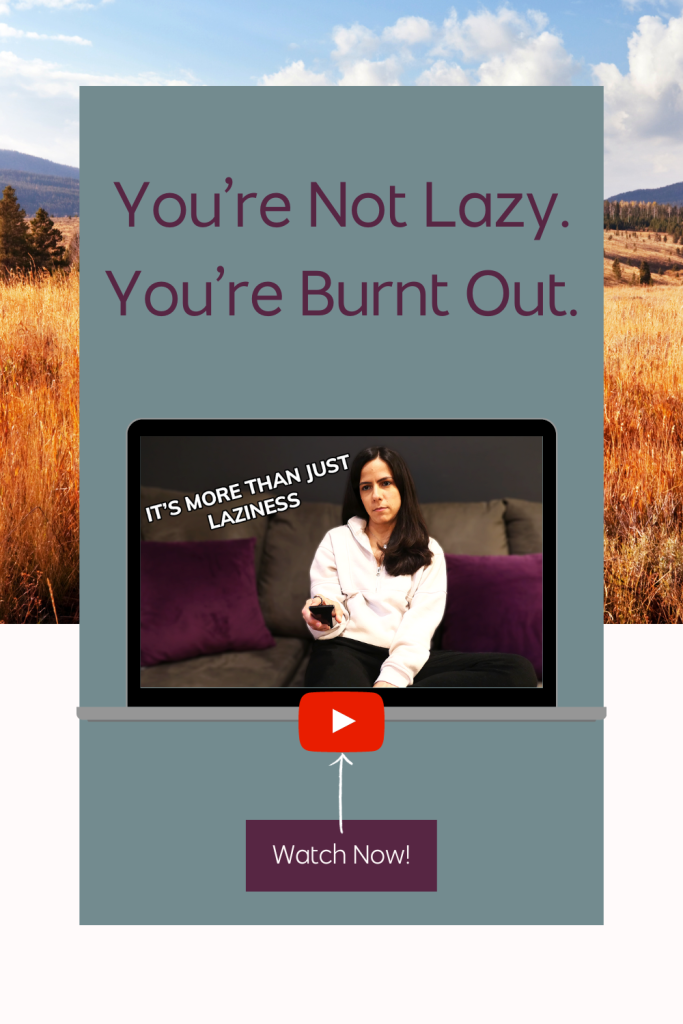
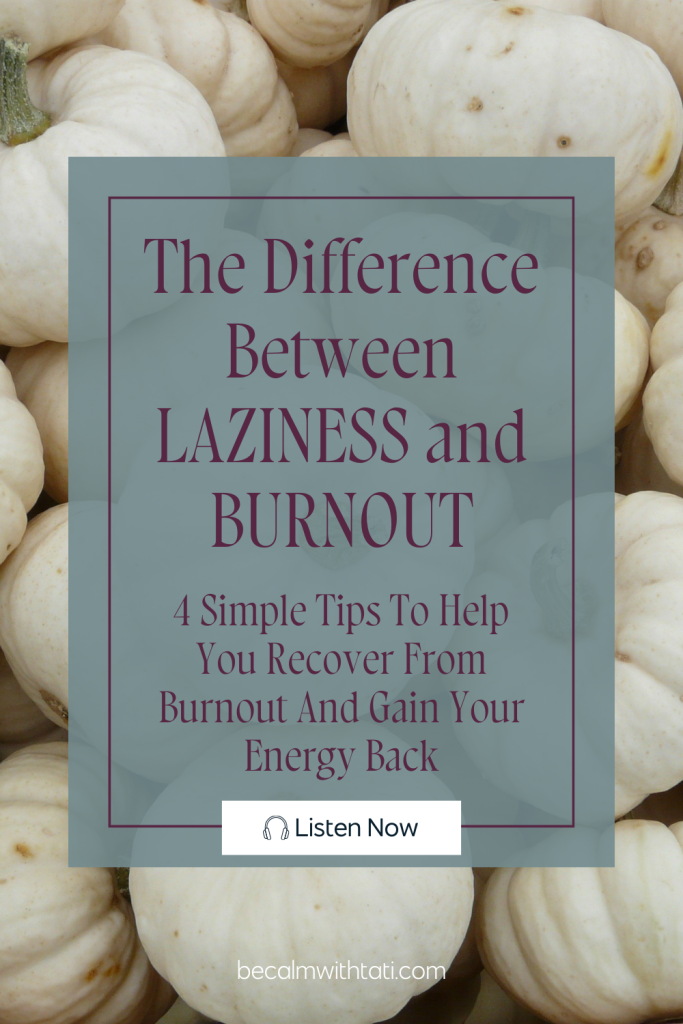
Until next time…




